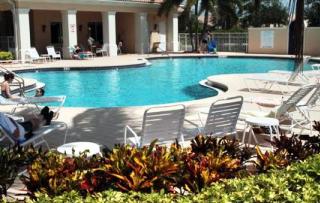|
Article Courtesy of The Palm Beach Post By Kimberly Miller Published January 18, 2011
Throughout South Florida, where homeowner associations reign over the fading fortunes of gated communities and condominiums, governing boards are using more aggressive - some say guerrilla - tactics to collect late fees. Emboldened by a new law that allows boards to ban non-paying homeowners from community common areas, associations also are restricting residents' access to their homes by disabling devices that allow automatic entry into neighborhoods.
But a wider interpretation is also forcing some debtors to wait in the visitors' line at entrance gates. In condominiums where key fobs are used to gain entrance, homeowners with association debt sneak in behind other residents or head to the security desk for permission to enter. Residents say blocking access to their homes is just bullying, and in conflict with other language in the law. Attorneys who represent associations say it's one of the most effective ways to collect late fees - along with turning off cable TV. "We are beyond the days when you tar and feather people, and I don't think we can put a scarlet letter on someone," said attorney Gary Poliakoff, whose Fort Lauderdale-based firm represents associations. "These are some harsh measures, but they are causing the owner to reflect on the fact that they are forcing others to pick up the burden of maintaining the community." At Palm City's Piper's Landing, visitors of non-paying residents are not allowed to drive into the community; they must be picked up at the gate by the resident and shuttled inside. Food delivery personnel are similarly barred from entering. Association dues typically vary by type of home, but a recent real estate listing showed the annual neighborhood dues at Piper's Landing as $4,736 for a four-bedroom home. One resident said a social membership in the community's club costs about $15,000 annually. Piper's Landing officials declined to comment, but for an idea of community morale, consider an admonishment in a summer letter to residents about "heckling, name-calling, shouting out comments and just generally being disorderly" at board meetings. "If you cannot act like ladies and gentlemen, do not attend meetings in the future," the letter states. One association attorney said she has heard of the formation of "citizen brigades" to enforce the new law, and even the removal of mailbox doors to persuade residents to pay. "I told them they couldn't do that," said Donna Berger, managing partner at Katzman, Garfinkel and Berger in Fort Lauderdale and executive director of the Community Advocacy Network. "Tempers are high." Homeowners facing a resident entrance ban point to a part of the law that says "suspension of common-area-use rights do not impair the right of an owner or tenant to have vehicular and pedestrian ingress to and egress from the parcel." Daniel Cianciotto, a resident of the 500-home Canyon Lakes community in suburban Boynton Beach, argued that portion of the law last month when his association moved to deactivate his transponder. In foreclosure and with a $17,000 debt to the homeowner association, including late fees and attorney fees, Cianciotto said a grievance committee sided with him against the board. "I was angry as can be and felt violated," Cianciotto said. "Why do I have to wait to get to my house? That's my house. Nobody should get in the way of me getting there." A four-bedroom Canyon Lakes home is listed for sale online with a $325-a-month association fee. Berger said restricting resident access is a gray area of the law. Technically, residents still can reach their homes; they just have to go through the same process as visitors. The Community Advocacy Network, which supported last year's legislation on the common-use-area restrictions, is going back to lawmakers this year asking for clarifications in the law. One request is for stronger language allowing the suspension of cable TV . "You would be surprised how compelling it is when HBO and Showtime may be turned off," Berger said. "They seem to find the money then." |
